Marshmallow root tea soothes your sore throat thanks to its rich mucilage content. This natural compound forms a protective coating over your irritated throat tissues, reducing pain and inflammation. The tea's anti-inflammatory properties, derived from flavonoids and antioxidants, further alleviate discomfort. It also stimulates mucus production, lubricating your throat and easing swallowing. Additionally, marshmallow root tea boosts your immune system, potentially shortening the duration of your illness. Its mild, slightly sweet taste makes it easy to consume, and you can enhance its effects by adding honey or lemon. Discover how this ancient remedy can provide you with natural, effective relief for your sore throat.
Key Takeaways
- Marshmallow root contains mucilage, which coats and protects irritated throat tissues, providing immediate and prolonged relief.
- The tea's anti-inflammatory properties reduce throat inflammation and ease swallowing discomfort.
- Antioxidants in marshmallow root tea combat oxidative stress and support overall throat health.
- The tea stimulates the production of protective mucus, lubricating the throat and alleviating irritation.
- Marshmallow root exhibits antimicrobial activity against certain bacteria, potentially aiding in throat infection recovery.
Understanding Marshmallow Root Tea

Marshmallow root tea has been around for centuries, offering a natural remedy for various ailments. This herbal infusion is derived from the roots of the marshmallow plant (Althaea officinalis), which is native to Europe and parts of Asia.
Don't confuse it with the sweet treat you roast over campfires; this plant has nothing to do with those sugary confections.
When you brew marshmallow root tea, you're extracting its beneficial compounds, including mucilage, flavonoids, and antioxidants. Mucilage is a thick, gel-like substance that coats and soothes irritated tissues in your throat and digestive tract. It's this property that makes the tea particularly effective for sore throats.
To prepare the tea, you'll typically steep dried marshmallow root in hot water for about 10-15 minutes. The resulting brew has a mild, slightly sweet taste with earthy undertones. You can drink it hot or cold, and it's often combined with other herbs like licorice or honey for added flavor and benefits.
While it's generally safe for most people, you should consult your healthcare provider if you're pregnant, nursing, or taking medications, as it may interact with certain drugs.
Historical Use of Marshmallow Root
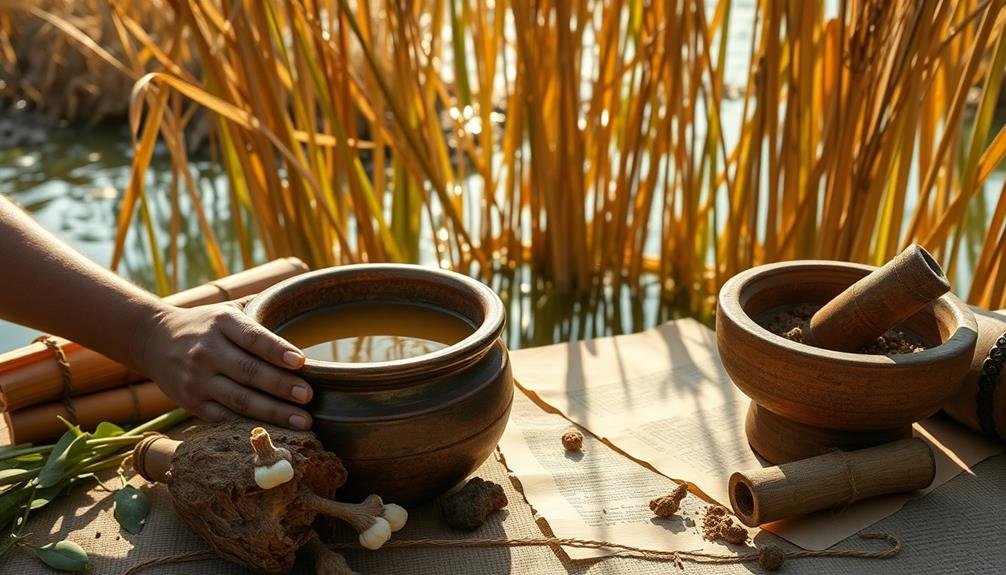
The use of marshmallow root as a medicinal herb dates back thousands of years. Ancient Egyptians were among the first to discover its healing properties, using it to treat sore throats, coughs, and other respiratory issues. They also consumed it as food and used it in offerings to their gods.
In ancient Greece and Rome, physicians like Hippocrates and Pliny the Elder recommended marshmallow root for various ailments. They recognized its ability to soothe inflammation and heal wounds.
During the Middle Ages, Arab physicians further expanded its use, incorporating it into treatments for digestive problems and urinary tract infections.
Throughout Europe, marshmallow root gained popularity as a remedy for coughs, bronchitis, and digestive issues.
Native Americans also discovered its benefits independently, using it to treat wounds, sore throats, and even as a food source during times of scarcity.
Active Compounds in Marshmallow Root
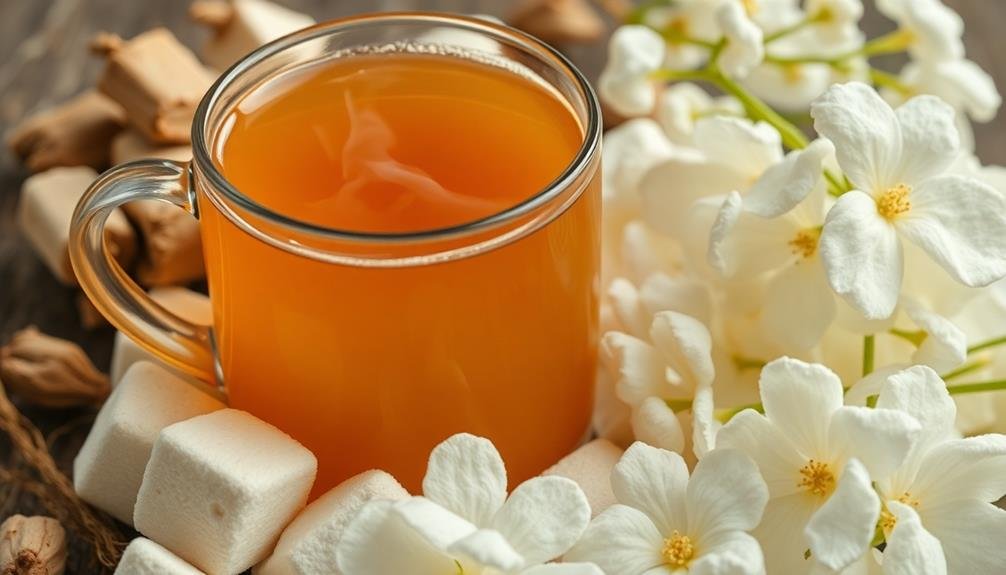
Complexity lies at the heart of marshmallow root's therapeutic properties. The plant's effectiveness stems from a blend of active compounds that work together to soothe your sore throat. You'll find that mucilage, a gel-like substance, is the star player. It coats and protects irritated tissues, providing relief from pain and inflammation.
But mucilage isn't working alone. Flavonoids in marshmallow root contribute antioxidant and anti-inflammatory effects, helping to reduce swelling and fight off harmful free radicals. Tannins add to the mix with their astringent properties, which can help tighten and protect tissues.
You'll also benefit from polysaccharides that boost your immune system, potentially speeding up your recovery. Asparagine, an amino acid found in the root, acts as a mild diuretic and anti-inflammatory agent. Pectin aids in digestion and may help alleviate gastrointestinal discomfort often associated with throat infections.
These compounds work synergistically, creating a powerful natural remedy. When you drink marshmallow root tea, you're not just consuming a single active ingredient, but harnessing a complex array of beneficial substances tailored by nature to provide relief.
Anti-Inflammatory Properties
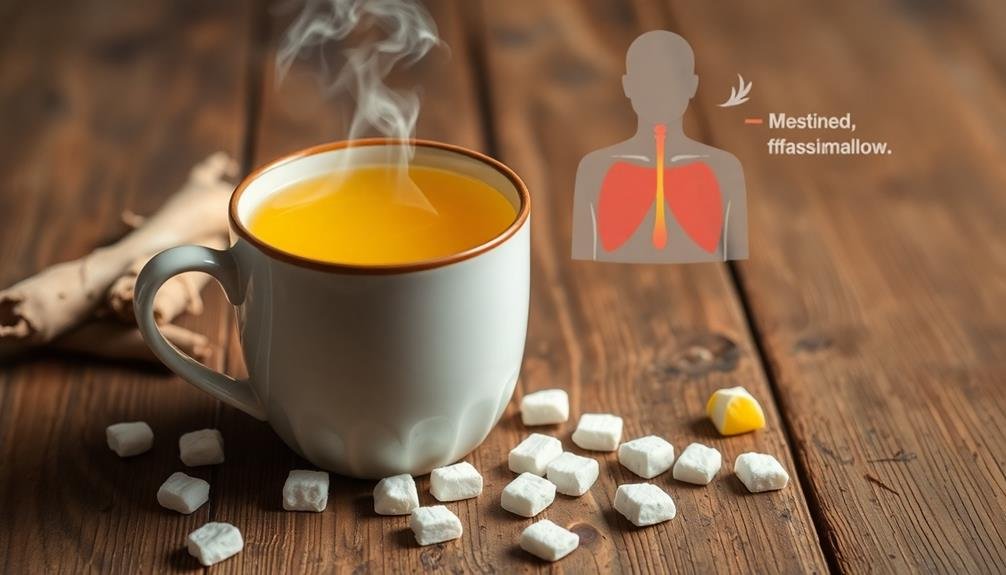
One of the most significant benefits of marshmallow root tea lies in its potent anti-inflammatory properties. When you're suffering from a sore throat, inflammation is often the culprit behind your discomfort. Marshmallow root contains compounds that can help reduce this inflammation, providing relief from pain and swelling.
The key anti-inflammatory agents in marshmallow root are polysaccharides and flavonoids. These compounds work by inhibiting the production of pro-inflammatory molecules in your body. As a result, they can help decrease the redness, swelling, and pain associated with a sore throat.
When you drink marshmallow root tea, you're coating your throat with a soothing mucilage that not only provides immediate relief but also helps reduce inflammation over time. This dual action makes it an effective remedy for sore throats caused by various factors, including viral infections, allergies, or environmental irritants.
Additionally, the anti-inflammatory properties of marshmallow root can extend beyond your throat. They may help alleviate inflammation throughout your respiratory system, potentially easing symptoms of conditions like bronchitis or asthma.
Mucilage and Throat Coating
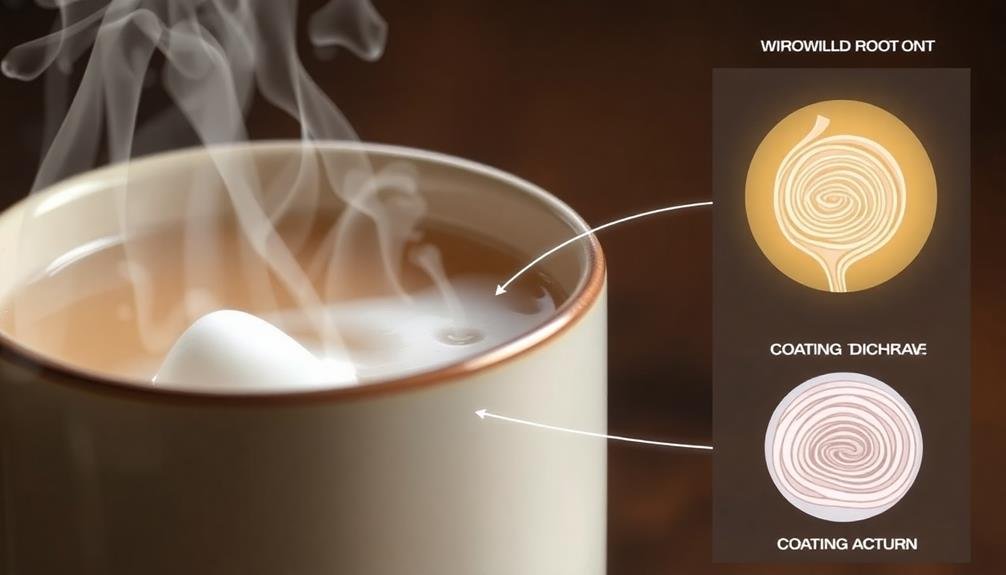
While anti-inflammatory properties play a significant role in marshmallow root's effectiveness, its mucilage content is equally important for soothing sore throats. Mucilage is a thick, gel-like substance that coats and protects irritated tissues.
When you drink marshmallow root tea, this mucilage forms a protective layer over your throat's inflamed areas, providing immediate relief and reducing discomfort.
The coating action of mucilage serves multiple purposes. It helps to lubricate your throat, making swallowing less painful. This protective barrier also shields sensitive tissues from further irritation caused by saliva, food, or drinks.
Additionally, it can trap and eliminate harmful bacteria or viruses that may be contributing to your sore throat.
You'll notice the soothing effects of marshmallow root tea almost immediately after drinking it. The mucilage's coating action can last for several hours, offering prolonged relief.
To maximize these benefits, you can sip the tea slowly throughout the day. This continuous exposure guarantees that your throat remains coated and protected, helping to speed up the healing process and alleviate symptoms more effectively than sporadic consumption.
Immune System Support

Marshmallow root tea doesn't just soothe your throat; it also bolsters your immune system. This herbal remedy contains antioxidants that help protect your cells from damage caused by free radicals. These antioxidants, including flavonoids and phenolic acids, work to reduce inflammation throughout your body, which can help your immune system function more efficiently.
The tea's immune-boosting properties extend beyond antioxidants. It's rich in vitamin C, an essential nutrient for immune health that stimulates the production and function of white blood cells. Additionally, marshmallow root contains zinc, which plays an important role in the development and function of immune cells.
When you're fighting off a sore throat or other illness, marshmallow root tea can help activate your body's natural defense mechanisms. It stimulates the production of cytokines, signaling molecules that help coordinate your immune response.
This action can potentially shorten the duration of your illness and reduce its severity.
Antioxidant Benefits

How does marshmallow root tea protect your body at a cellular level? This soothing beverage is packed with antioxidants that combat free radicals, molecules that can damage your cells and contribute to various health issues. Marshmallow root contains flavonoids and phenolic compounds, which are powerful antioxidants that help neutralize these harmful molecules.
When you drink marshmallow root tea, you're giving your body a boost of these protective compounds. They work to reduce oxidative stress, which is linked to inflammation, aging, and various chronic diseases. The antioxidants in marshmallow root can help support your overall health by:
| Benefit | Effect | Impact |
|---|---|---|
| Cell protection | Neutralizes free radicals | Reduces cellular damage |
| Anti-aging | Slows oxidative processes | Supports skin health |
| Heart health | Improves blood vessel function | Promotes cardiovascular wellness |
| Inflammation reduction | Decreases inflammatory markers | Eases various health conditions |
Preparation Methods
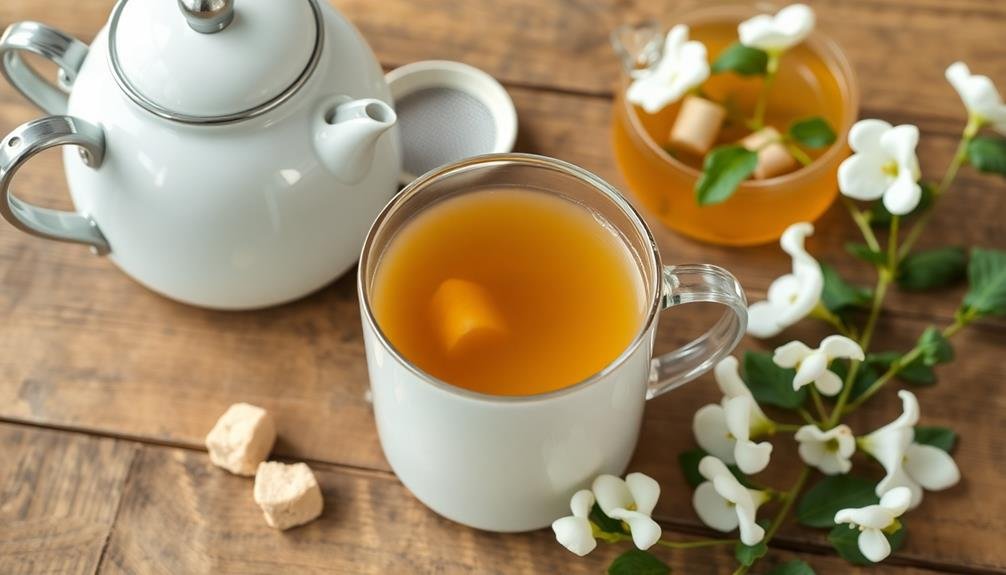
To get the most out of your marshmallow root tea, it's essential to prepare it correctly. Start by using one tablespoon of dried marshmallow root per cup of water. Place the herb in a tea infuser or directly into your cup. Pour hot water (not boiling) over the root and let it steep for 10-15 minutes. The longer you steep, the stronger the tea will be.
For a cold infusion, which some believe extracts more mucilage, add the root to room temperature water and let it sit for 4-8 hours or overnight. Strain and drink when ready.
You can enhance the flavor and benefits of your marshmallow root tea by:
- Adding a teaspoon of honey for extra soothing properties
- Mixing in a slice of lemon for vitamin C
- Combining it with other herbs like licorice root or slippery elm
- Sprinkling in a pinch of cinnamon for warmth and taste
Remember to drink your tea slowly, allowing it to coat your throat as you swallow. You can enjoy up to three cups a day when you're feeling under the weather.
Always consult with a healthcare professional before using herbal remedies, especially if you're pregnant, nursing, or taking medications.
Dosage and Safety Considerations

Three key factors determine the safe usage of marshmallow root tea: dosage, frequency, and individual health conditions. For adults, a typical dose is 1-2 teaspoons of dried marshmallow root per cup of hot water, steeped for 5-10 minutes. You can drink this tea up to three times daily.
However, it's vital to start with a lower dose and gradually increase it to assess your tolerance. If you're pregnant, breastfeeding, or have diabetes, consult your healthcare provider before using marshmallow root tea. It may interact with certain medications, particularly those taken orally, as it can potentially affect their absorption.
Wait at least two hours between drinking the tea and taking any medications. While marshmallow root is generally considered safe, some people may experience side effects such as stomach upset or dizziness. If you notice any adverse reactions, discontinue use immediately.
Don't use marshmallow root tea for extended periods without medical supervision. For children, reduce the dosage by half and limit consumption to once daily. Remember, natural remedies can be powerful, so always use them responsibly and in moderation.
Combining With Other Herbs
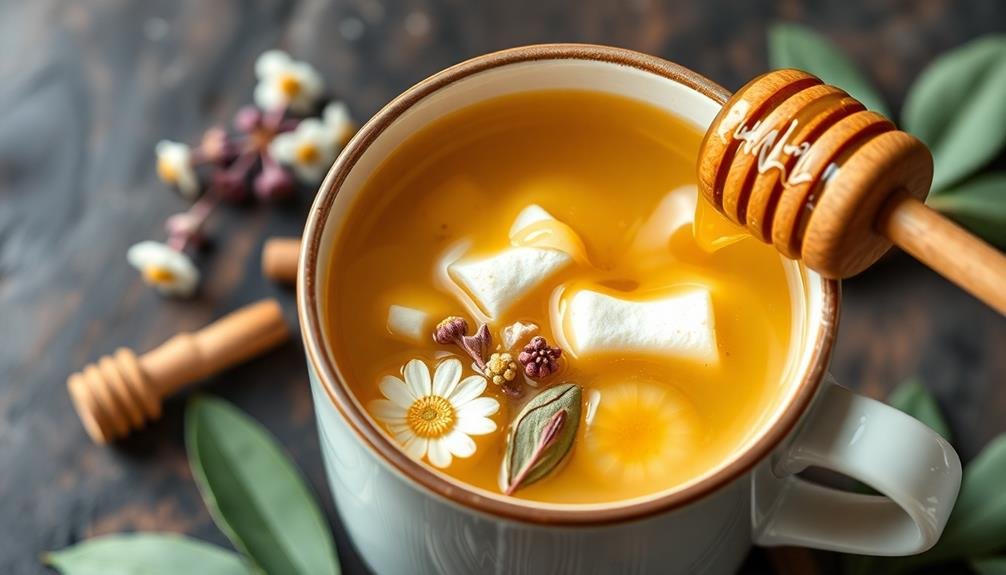
You can enhance the effectiveness of marshmallow root tea by combining it with other beneficial herbs.
Adding licorice root can amplify the soothing effects, while slippery elm provides an extra protective coating for your irritated throat.
For an even more potent remedy, try stirring in some honey, which will boost the tea's healing properties and improve its taste.
Licorice Root Amplifies Benefits
While marshmallow root tea is effective on its own, combining it with licorice root can amplify its soothing properties for sore throats. Licorice root contains glycyrrhizin, a compound that complements marshmallow root's mucilage. This powerful duo creates a more potent remedy for throat irritation and inflammation.
When you blend these two herbs, you'll experience enhanced benefits:
- Increased mucus production to coat and protect your throat
- Stronger anti-inflammatory effects to reduce swelling
- Extended duration of relief from pain and discomfort
- Improved taste, making the tea more enjoyable to drink
To prepare this combination, steep equal parts of marshmallow root and licorice root in hot water for 10-15 minutes. You can add honey or lemon for extra flavor and antibacterial properties.
However, be cautious with licorice root if you have high blood pressure or are pregnant, as it may cause side effects in some individuals. Always consult your healthcare provider before incorporating new herbal remedies into your routine, especially if you're taking medications or have underlying health conditions.
Slippery Elm Adds Coating
Combining slippery elm with marshmallow root tea creates a powerful duo for soothing sore throats.
Slippery elm bark contains mucilage, a gel-like substance that coats and protects irritated tissues in your throat. When you add it to your marshmallow root tea, you're enhancing the soothing effects and creating a more thorough remedy.
Slippery elm's coating action complements marshmallow root's anti-inflammatory properties. As you sip this blend, you'll notice a silky texture that lingers, providing longer-lasting relief.
The combination can help reduce pain, inflammation, and irritation more effectively than either herb alone.
To incorporate slippery elm, steep 1-2 teaspoons of the powdered bark in your prepared marshmallow root tea for about 5 minutes.
Strain and drink while it's warm. You can also find pre-made tea bags that contain both herbs for convenience.
Honey Enhances Healing Properties
Adding honey to your marshmallow root tea not only enhances its flavor but also boosts its healing properties. Honey is a natural antibacterial agent that can help fight off infections causing your sore throat. When combined with marshmallow root's soothing properties, you'll experience faster relief and improved overall effectiveness.
Honey's viscous nature also helps the tea coat your throat more effectively, prolonging the contact time of marshmallow root's beneficial compounds. This combination creates a powerful duo that can:
- Reduce inflammation in your throat tissues
- Provide a protective barrier against irritants
- Soothe pain and discomfort
- Boost your immune system to fight off infections
You can further enhance your marshmallow root and honey tea by adding other beneficial herbs. Consider incorporating ginger for its anti-inflammatory properties, or lemon for an extra vitamin C boost.
Experiment with different combinations to find what works best for you. Remember to use raw, organic honey for maximum benefits, as processed honey may lack some of the natural healing properties.
Potential Side Effects

Safety is paramount when considering any natural remedy. While marshmallow root tea is generally safe for most people, you should be aware of potential side effects.
If you're pregnant or breastfeeding, consult your doctor before using this herb, as its safety hasn't been thoroughly studied in these situations.
You might experience digestive issues like stomach upset or diarrhea when consuming marshmallow root tea. If you have diabetes, monitor your blood sugar levels closely, as the herb may lower blood sugar.
It's also possible that marshmallow root could interfere with the absorption of certain medications, so take it at least two hours before or after other drugs.
Some people may be allergic to marshmallow root, though this is rare. If you notice symptoms like itching, swelling, or difficulty breathing, stop use immediately and seek medical attention.
Additionally, excessive consumption of marshmallow root tea may lead to electrolyte imbalances due to its diuretic properties. As with any herbal remedy, moderation is key.
If you experience any unusual symptoms or persistent discomfort, discontinue use and consult your healthcare provider.
Scientific Studies and Evidence

While anecdotal evidence supports the use of marshmallow root tea for sore throats, scientific research on its efficacy is limited but promising. Studies have shown that marshmallow root contains mucilage, a gel-like substance that can coat and soothe irritated tissues. This property may explain its potential effectiveness in relieving sore throat symptoms.
A 2020 review published in the Journal of Ethnopharmacology highlighted marshmallow root's anti-inflammatory and antioxidant properties, suggesting it could help reduce throat inflammation. Additionally, a 2018 study in the Journal of Complementary and Integrative Medicine found that marshmallow root extract exhibited antimicrobial activity against certain bacteria.
While more research is needed to fully understand marshmallow root tea's effects on sore throats, existing studies indicate several potential benefits:
- Reduction of throat irritation and inflammation
- Possible antimicrobial action against throat infections
- Increased mucus production to lubricate the throat
- Potential immune-boosting properties
As you consider using marshmallow root tea for your sore throat, remember that while scientific evidence is growing, it's still limited.
Always consult with your healthcare provider before using any herbal remedies, especially if you have existing health conditions or are taking medications.
Alternatives for Sore Throat Relief

In addition to marshmallow root tea, there are several other natural remedies and over-the-counter options for sore throat relief. You can try gargling with warm salt water, which helps reduce swelling and provides temporary pain relief. Honey is another popular choice, known for its antibacterial properties and soothing effects.
Over-the-counter lozenges and sprays containing ingredients like benzocaine or menthol can numb your throat and provide quick relief. For more severe cases, you might consider using ibuprofen or acetaminophen to reduce inflammation and alleviate pain.
Here's a comparison of some alternative sore throat remedies:
| Remedy | Pros | Cons |
|---|---|---|
| Salt water gargle | Inexpensive, readily available | Temporary relief, taste |
| Honey | Natural, antibacterial | High sugar content |
| Lozenges | Convenient, long-lasting | May contain artificial ingredients |
| Pain relievers | Effective for pain and inflammation | Potential side effects |
Remember to stay hydrated and avoid irritants like smoking or dry air. If your sore throat persists or worsens, consult your healthcare provider to rule out more serious conditions.
Frequently Asked Questions
Can Children Drink Marshmallow Root Tea for Sore Throats?
You can give marshmallow root tea to children for sore throats, but it's best to consult a pediatrician first. It's generally safe, but dosage matters. Always monitor your child for any adverse reactions when trying new remedies.
Does Marshmallow Root Tea Interact With Any Medications?
Yes, marshmallow root tea can interact with certain medications. It may affect how your body absorbs some drugs. If you're taking any medications, you should consult your doctor before drinking this tea to guarantee it's safe for you.
How Long Does the Soothing Effect of Marshmallow Root Tea Last?
You'll typically feel the soothing effects of marshmallow root tea for about 1-2 hours after drinking it. However, everyone's different, so you might experience relief for longer or shorter periods. It's best to sip it throughout the day.
Can Marshmallow Root Tea Be Consumed Cold or Iced?
Yes, you can enjoy marshmallow root tea cold or iced. It's a versatile beverage that's soothing whether hot or chilled. You'll find it invigorating on warm days, and it still retains its throat-coating properties when served cold.
Is Marshmallow Root Tea Safe for Pregnant or Breastfeeding Women?
If you're pregnant or breastfeeding, you should consult your doctor before drinking marshmallow root tea. There's limited research on its safety during these periods, so it's best to err on the side of caution and seek professional advice.
In Summary
You've now discovered why marshmallow root tea is a go-to remedy for sore throats. Its anti-inflammatory properties and soothing mucilage can provide quick relief. While scientific evidence is still emerging, centuries of traditional use support its effectiveness. Remember to consult your doctor before trying new remedies, especially if you're on medication. Whether you choose marshmallow root tea or other alternatives, you're now better equipped to tackle that pesky sore throat.




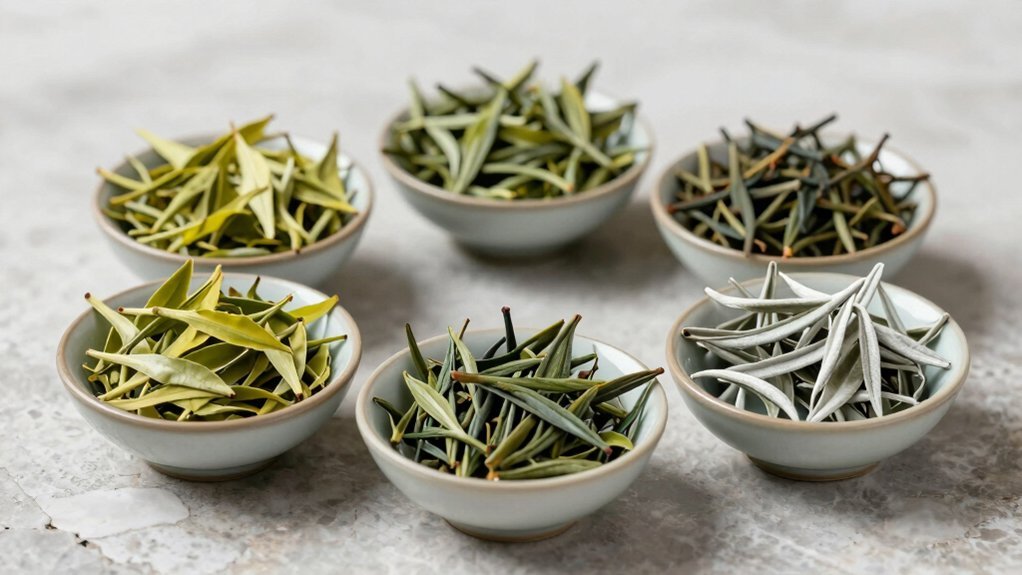
Leave a Reply